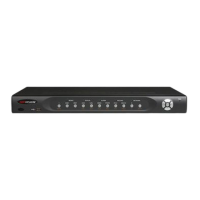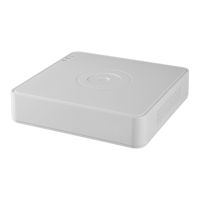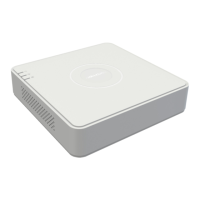Do you have a question about the HIKVISION DS-7108HI series and is the answer not in the manual?
Overview of the DS-7108 series network DVR, its technology, and applications.
Details on compression, storage, preview, network, and other features of the DVR.
Instructions and notice for installing the Hard Disk Drive (HDD) into the DVR.
Identification and description of various connectors and ports on the rear panel of the DS-7018HI.
Explanation of the front panel layout and the function of each button and indicator.
Overview of the main menu structure and its categories like Display, Image, Recording, Network, etc.
Guide on how to input text, numbers, and symbols using the on-screen keyboard and selection methods.
Steps for correctly connecting the power supply and turning on the DVR, including LED indicators.
Information on default administrator credentials and how to log in to the DVR.
How to access the playback interface and select channels or recorded files for playback.
Correct procedures for shutting down the DVR normally using the menu or power button, and warnings about abnormal shutdowns.
Information on the default administrator credentials and how to modify the password.
Guide on setting up privacy masks to cover sensitive areas in the video feed, preventing preview and recording.
Steps to set up motion detection sensitivity and define motion detection areas within the camera's view.
Configuration of network settings like IP address, port, subnet mask, and gateway for DVR access.
How to configure RS-485 parameters for PTZ control and select the appropriate PTZ protocol.
Instructions for upgrading the DVR firmware via FTP or USB, including setup steps.
How to check HDD status and format the hard disk drive.
How to access and view system logs recorded by the DVR.
Steps to set up an FTP server for firmware upgrades, including software selection and user configuration.
Overview of different firmware upgrade modes (client software, FTP, USB, TFTP) and initial setup steps for TFTP.
Table listing common failures and their possible causes for troubleshooting.











